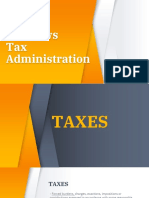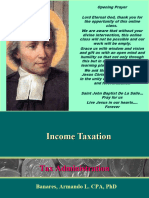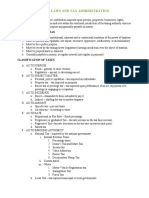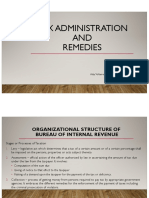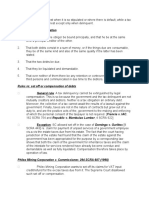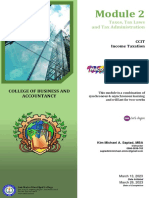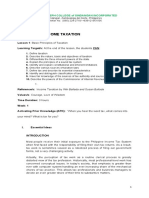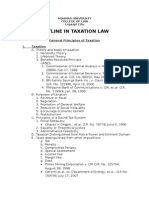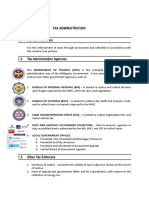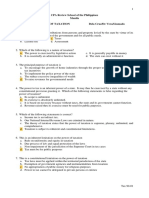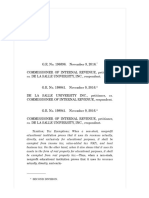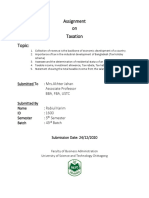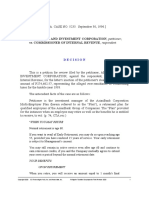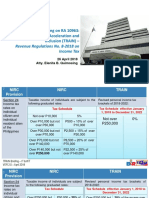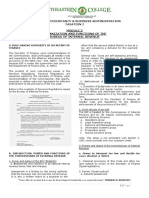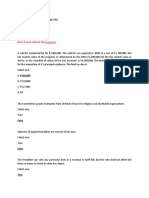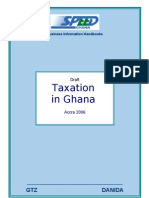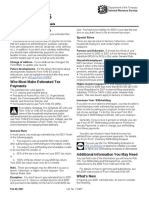23/02/2024
PRE 28 | LESSON 2
The Bureau of
Internal Revenue
REAB, CPA
What is the
BIR?
The Bureau of Internal Revenue shall be under the supervision
and control of the Department of Finance and its powers and
duties shall comprehend the assessment and collection of all
national internal revenue taxes, fees, and charges, and the
enforcement of all forfeitures, penalties, and fines connected
therewith, including the execution of judgments in all cases
decided in its favor by the Court of Tax Appeals and the
ordinary courts.
1
� 23/02/2024
Powers and
Duties
1. Assessment and collection of taxes.
2. Enforcement of all forfeitures, penalties and fines, and judgments
in all cases decided in its favor by the courts.
3. Giving effect to, and administering the supervisory and police
powers conferred to it by the NIRC and other laws
4. Assignment of internal revenue officers and other employees to
other duties
Powers and
Duties
5. Provision and distribution of forms, receipts, certificates, stamps,
etc. to proper officials
6. Issuance of receipts and clearances
7. Submission of annual report, pertinent information to Congress
and reports to the Congressional Oversight Committee in matters of
taxation
2
� 23/02/2024
Chief
Officials
1. 1 Commissioner
2. 4 Deputy Commissioners:
╸ Operations group
╸ Legal Enforcement group
╸ Information Systems group
╸ Resource Management group
Powers of
The CIR
1. To interpret the provisions of the NIRC, subject to review by the
Secretary of Finance
2. To decide tax cases, subject to the exclusive appellate jurisdiction
of the Court of Tax Appeals, such as:
╸ Disputed assessments
╸ Refunds of internal revenue taxes, fees, or other charges
╸ Penalties imposed
╸ Other NIRC and special law matters administered by the BIR
3
� 23/02/2024
Powers of
The CIR
3. To obtain information and to summon, examine, and take
testimony of persons to effect tax collection
4. To make assessment and prescribe additional requirement for
administration and enforcement tax
5. To examine tax returns and determine tax due thereon
6. To conduct inventory taking or surveillance
Powers of
The CIR
7. To prescribe presumptive gross sales and receipts for a taxpayer
when:
╸ The taxpayer failed to issue receipts
╸ The CIR believes that the books or other records of the taxpayer
do not correctly reflect the declaration in the return.
4
� 23/02/2024
Powers of
The CIR
8. To terminate tax period when the taxpayer is:
╸ Retiring from business
╸ Intending to leave the Philippines
╸ Intending to remove, hide, or conceal his property
╸ Intending to perform any act tending to obstruct the proceedings
for the collection of tax or render the same ineffective
Powers of
The CIR
9. To prescribe real property values
10. To compromise tax liabilities of taxpayers
11. To inquire into bank deposits, only under the following instances:
╸ Determination of the gross estate of a decedent
╸ To substantiate the taxpayer's claim of financial incapacity to pay
tax in an application for tax compromise
10
5
� 23/02/2024
Powers of
The CIR
12. To accredit and register tax agents
13. To refund or credit internal revenue taxes
14. To abate or cancel tax liabilities in certain cases
11
Powers of
The CIR
15. To prescribe additional procedures or documentary
requirements
16. To delegate his powers to any subordinate officer with a rank
equivalent to a division chief of an office
12
6
� 23/02/2024
Stages of the
Exercise of
TAXATION
POWER
13
Stages of the Exercise Levy
of Taxation Power Imposition
This process involves the enactment of a tax law by Congress and is called
impact of taxation. It is also referred to as the legislative act in taxation.
Congress is composed of two bodies:
1. The House of Representatives, and
2. The Senate
As mandated by the Constitution, tax bills must originate from the House of
Representatives. Each may, however, have their own versions of a proposed law
which is approved by both bodies, but tax bills cannot originate exclusively from
the Senate.
14
7
� 23/02/2024
Stages of the Exercise Assessment
of Taxation Power Collection
The tax law is implemented by the administrative branch of the government.
Implementation involves assessment or the determination of the tax liabilities of
taxpayers and collection.
This stage is referred to as incidence of taxation or the administrative act of
taxation.
15
16
8
� 23/02/2024
The
TAX
SYSTEM
The tax system refers to the methods or schemes of imposing,
assessing, and collecting taxes. It includes all the tax laws and
regulations, the means of their enforcement, and the
government offices, bureaus and withholding agents which are
part of the machineries of the government in tax collection.
The Philippine tax system is divided into two: the national tax
system and the local tax system.
17
Types of According to
Tax System Impositions
1. Progressive - employed in the taxation of income of individuals,
and transfers of properties by individuals
2. Proportional - employed in taxation of corporate income and
business
3. Regressive - not employed in the Philippines
18
9
� 23/02/2024
Types of According to
Tax System Impact
1. Progressive
A progressive tax system is one that emphasizes direct taxes. A
direct tax cannot be shifted. Hence, it encourages economic
efficiency as it leaves no other resort to taxpayers than to be
efficient. This type of tax system impacts more upon the rich.
19
Types of According to
Tax System Impact
2. Regressive
A regressive tax system is one that emphasizes indirect taxes.
Indirect taxes are shifted by businesses to consumers; hence, the
impact of taxation rests upon the bottom end of the society. In
effect, a regressive tax system is anti-poor.
It is widely believed that despite the Constitutional guarantee of a
progressive taxation, the Philippines has a dominantly regressive
tax system due to the prevalence of business taxes.
20
10
� 23/02/2024
Principles of Sound
Tax System
1. Fiscal Adequacy
Fiscal adequacy requires that the sources of government funds must
be sufficient to cover government costs.
The government must not incur a deficit. A budget deficit paralyzes
the government's ability to deliver the essential public services to the
people.
Hence, taxes should increase in response to increase in government
spending.
21
Principles of Sound
Tax System
2. Theoretical Justice
Theoretical justice or equity suggests that taxation should consider
the taxpayer’s ability to pay.
It also suggests that the exercise of taxation should not be
oppressive, unjust, or confiscatory.
22
11
� 23/02/2024
Principles of Sound
Tax System
3. Administrative Feasibility
Administrative feasibility suggests that tax laws should be capable of
efficient and effective administration to encourage compliance.
Government should make it easy for the taxpayer to comply by
avoiding administrative bottlenecks and reducing compliance costs.
23
“ Thank you.
Reference:
Banggawan, R. (2014). “Income Taxation: Laws, Principles, and
Applications 2019 OBE Edition”
https://www.bir.gov.ph/index.php/philippine-transparency-seal/bir-
mandate.html
https://www.bir.gov.ph/images/bir_files/internal_communications_1/Or
ganizational%20Structure/RAO%20No.%201-
2018%20Annex%20A.PDF
24
12


